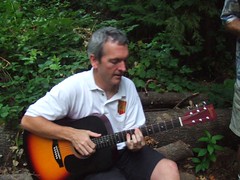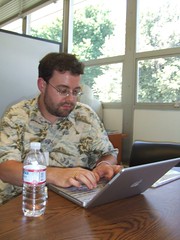For the moment, the home page of Tech Matters 2006 reads like this…
Tech Liaisons participating in Tech Matters ’06 are from all over the country. Look at the map below to see where everyone is from and what Writing Project they are with.
NWP : Technology Matters 2006 : Welcome!
Sadly enough, I am blogging right now from the airport as everyone who was gathered in Chico this week now scatters back to their original points on this map. We have had a spectacular week, however, so I know that the temporary feelings of leaving will soon be replaced by the excitement of nearing home and sharing new ideas with TCs back at our site. Thanks, Tonya, for creating this map for us.
For the moment, I offer some brief reflections after this one tech tip that I learned from Paul and Karen: If you are a blogger, get Flock. I have just downloaded and installed this new web browser which, according to Paul, is being developed by some former Firefox guys and is about as blogger-friendly as you can imagine.
As for my reflections on the week, I am constantly reminded how technology both flattens the world, in Friedman’s terms, as well as making the peaks and valleys of the digital divide even higher. We all came to TM06 with varying degrees of tech expertise in a variety of areas — blogging, wiki–ing, social bookmarking, Flickr–ing, digital storytelling, podcasting, etc. — and I think that we all left smarter than when we arrived. For some, the tools shared at TM06 opened up a whole new world of the read/write web. For others, these tools were old hat, but launched new learning and collaboration that wouldn’t have been possible before hand.
So, as I think about the variety of workshops that we will be offering at RCWP between now and the end of the summer, I am reminded of the fact that we have to plan accordingly. Generally, the pattern for TM06 was: 1) intro to the new literacy tool, 2) a case study of the tool, and 3) playtime. I think that I will carry that model back into my own workshops that focus on technology. The TM06 experience reminds me that all of us, from the geekiest to the most “tech-challenged” come with some ideas about how and why to use technology in our classrooms and, as a workshop facilitator, I need to be cognizant of that fact.
Well, enough for now. There are planes to catch and bills to pay, as Harry Chapin might say, and I want to finish up a few things here with the Sacramento Airport’s free wifi. Thanks SAC!
Blogged with Flock
Like this:
Like Loading...


